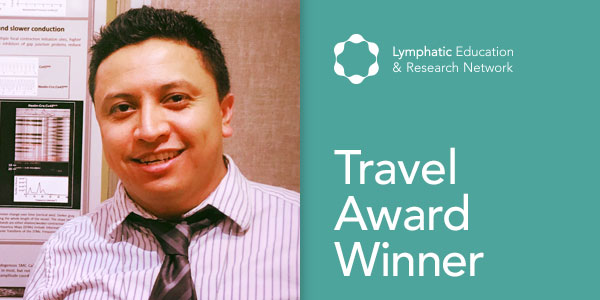Jorge A. Castorena, currently a post-doctoral Fellow at the Medical Pharmacology and Physiology Department of the University of Missouri (Columbia, MO, USA), under the supervision of Dr. Michael J. Davis, received a travel award from LE&RN to attend the 2016 Gordon Research Conference in Lymphatics held in Ventura, CA. We asked Jorge to share his thoughts on that experience with us and to tell us a bit about his research and future plans.
What did you get out of the Conference? Why did you feel it was important to attend?
The 2016 Gordon Research Conference in Lymphatics was my first conference to attend that specializes in the lymphatic system. As a physicist/bioengineer who has transitioned into the medical research field, attending the GRC-Lymphatics gave me the opportunity to interact with members of the lymphatic research community, and learn from research groups around the world about their different efforts to study, understand, and fight the various diseases that are associated with the lymphatic system. It was very important for me to attend this conference as I was able to show my research to people who brought different perspectives to it, I was able to receive invaluable feedback and suggestions that surely will help my project move forward, and I established new contacts that hopefully will soon develop into collaborations. At the GRC-Lymphatics, I was able to hear directly from people who suffer from lymphatic system diseases (i.e. lymphedema, lipedema); this is very important as it helps me understand what the most essential needs are for these patients and where the new research efforts need to be directed.
What are your areas of interest in research?
Because various forms of both congenital and acquired lymphedema have been associated with contraction defects (impaired lymph transport) in collecting lymphatic vessels, my current research focuses on the study and understanding of how spontaneous contractions are generated and propagated along the lymphatic vessel wall. This involves the study of cell-to-cell communication and electrical coupling, and electrical signal conduction mechanisms.
What are your hopes and plans for your career and your research?
I find medical research, and in particular research on the lymphatic system, fascinating. My plans for the future include applying for funding to develop my own research project, obtain a tenure-track faculty position, and establish my own lymphatic system research laboratory. I am interested in continuing to study cell-to-cell communication, with a particular emphasis in how endothelial cells interact and communicate with each other, with immune cells, and perhaps with the lymphatic muscle layer. I would like my research findings to advance what is known about lymphedema, lipedema, obesity, diabetes and Alzheimers disease. I see my future research bringing together multidisciplinary efforts (i.e. physiology, physics and bioengineering), and in this way developing research projects that have a defined translational component.
Why do you believe that, in general, lymphatic research is important? What might the field accomplish within the next few years?
Although the lymphatic system is an essential component of the circulatory system, lymphatic research has somehow been unappreciated. Furthermore, until recently, diseases associated with lymphatic system impairment remained unknown or poorly understood. Lymphatic research is important not only to understand lymphatic-associated diseases, and devise treatments that patients desperately need, but also it provides complementary knowledge to what is known about the cardiovascular system. As more and more investigators have started to look towards lymphatic system research, and as the research community in general continues to become more educated in terms of lymphatic system diseases, I truly believe that in the next few years crucial findings will allow for a better understanding of various diseases (e.g. lymphedema) and the development of new therapeutic techniques. However, this will require collaborative efforts from immunology, biology, physiology, genetics, physics, and bioengineering, among others.
Programs such as LE&RN's Travel Awards program advances the scientific community's understanding of lymphedema and lymphatic diseases, allows for increased communication between researchers, and raises the profile of lymphatic research in the scientific community. These programs are only possible as a result of the generosity and dedication of LE&RN's corporate sponsors and Supporting Members. If you are committed to LE&RN's mission of fighting lymphedema and lymphatic disease through education, research, and advocacy, become a LE&RN Supporting Member today. Supporting Membership begins at just $5/month.

